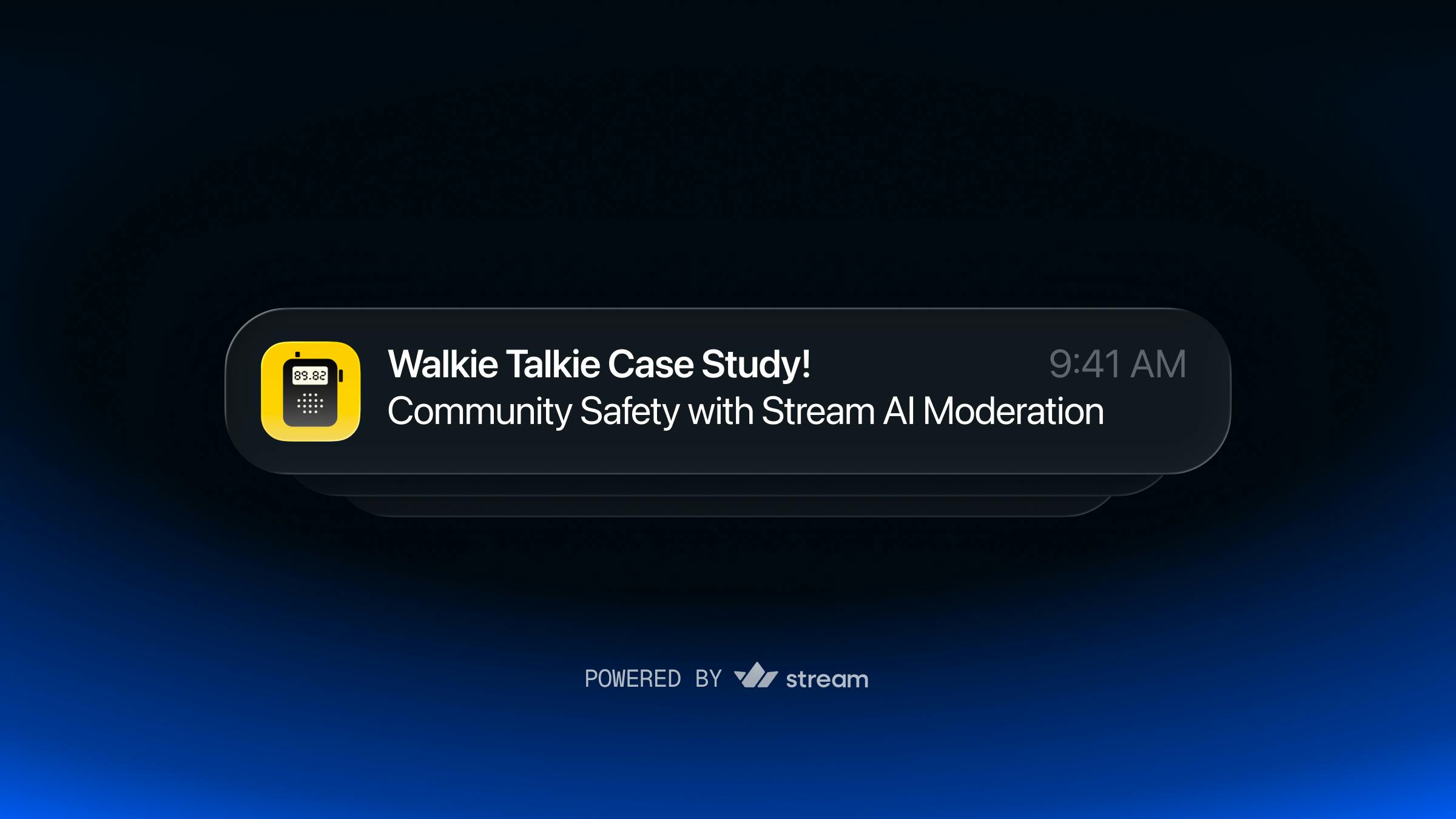For any community app, safety is non-negotiable. Toxic interactions can derail conversations, drive away users, and damage retention. But for smaller, fast-growing companies, building the kind of human moderation teams that Facebook or TikTok employ simply isn't feasible.
The Challenge of Moderation at Scale
Walkie Talkie, a global social audio app for Gen Z, faced this challenge head-on. Their app thrives on pseudonymous voice-first conversations, which encourage openness but also risk abuse. Early attempts at moderation relied on power users to flag problematic behavior. This approach was inconsistent, biased, and impossible to scale as millions of audio and chat interactions began flowing through the platform daily.
As founder Stéphane Giraudie explains, "It was binary for us, either we adopt AI moderation, or we have no moderation. Human teams weren't an option."
Why AI Moderation?
Human moderators are valuable, but they are:
- Slow: they can't respond to harmful content in real time.
- Expensive: a large, round-the-clock team is out of reach for most startups.
- Inconsistent: personal bias affects judgment.
AI content moderation, on the other hand, can:
- Analyze voice, text, and images instantly.
- Operate 24/7 at scale.
- Provide consistent scoring and categorization across dozens of harm categories.
Walkie Talkie decided to make AI the backbone of their moderation strategy, while still incorporating humans for validation and model fine-tuning.
The Walkie Talkie Approach
Walkie Talkie combined Stream's AI Moderation API for text and image analysis with partner AI speech engines to moderate live audio. Their workflow shows how AI and humans can complement each other:
1. User Reports + AI Scoring: When users report content, AI analyzes the conversation across Walkie Talkie's moderation policy that encompasses 49 harm categories (bullying, hate speech, sexual harassment, etc.) and assigns a score.
2. Automated Actions: Based on severity, the system automatically issues timeouts, suspensions, or permanent bans, no human intervention needed in most cases.
3. Human Alignment & Review: At first, trust and safety teams compared AI recommendations against human judgment. Once they confirmed the AI's decisions aligned with what humans would have done, Walkie Talkie allowed the system to enforce sanctions automatically.
Giraudie says, "We were very impressed right away that the AI recommendations matched what our human moderators would've done. Now the backend applies sanctions automatically. We just review and optimize the model from time to time."
Results: Safer Conversations, Happier Users
By adopting Stream's AI moderation, Walkie Talkie has been able to achieve the kind of safety outcomes that once required massive human teams. The impact shows up across several dimensions:
- Scalability Without Cost: Walkie Talkie eliminated the need for expensive human moderation teams while still protecting millions of messages and conversations.
- Consistency & Trust: AI enforces community guidelines fairly, without the biases that creep into human-only moderation.
- Lower Report Volumes: Since implementing AI moderation, Walkie Talkie has seen fewer user reports, a sign that harmful content is being caught earlier.
- Better Retention: Safe, positive conversations keep users coming back. As Giraudie says, "Good conversations and safe conversations are much better than ones where you get insulted. Removing toxic people quickly is essential to retention."
Together, these outcomes show that moderation isn't just a protective layer for Walkie Talkie, it's a driver of growth and community health.
The Future of Moderation
Walkie Talkie plans to expand their moderation system even further:
- Proactive monitoring of popular audio frequencies, not just reported users.
- Real-time feedback loops, where users get nudges like "slow down, that's not appropriate."
- Composite trust scores that blend AI moderation data with in-app behavior, similar to rider/driver ratings on Uber.
These innovations will allow Walkie Talkie to move from reactive protection to proactive community-building, ensuring that safety becomes a visible part of the user experience rather than just an invisible safeguard.
Takeaway for Community Apps
Content moderation is a critical component of growth for any app built around real-time conversation.
- Human moderators can't keep pace with the speed and scale of moderating chat, voice, and multimedia platforms.
- AI moderation ensures 24/7 coverage, consistent enforcement, and lower operating costs.
- Human oversight is still valuable for tuning models, handling edge cases, and reinforcing community values.
Giraudie adds, "Moderation needs to be central to your strategy. There's no room for error. Whether you're building chat, live audio, or video, catching harmful content quickly is critical to retention and growth."
Walkie Talkie's experience shows that with Stream's Moderation API, AI doesn't replace human moderators, it makes moderation possible at scale.

